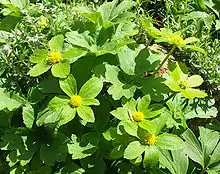Sanicula epipactis
Sanicula epipactis (syns Hacquetia epipactis, Dondia epipactis) is a species of flowering plant of the family Apiaceae, native to Europe.[1] Under the synonym Hacquetia epipactis, it was the only species in the monotypic genus Hacquetia.[2]
| Sanicula epipactis | |
|---|---|
 | |
| Scientific classification | |
| Kingdom: | Plantae |
| Clade: | Tracheophytes |
| Clade: | Angiosperms |
| Clade: | Eudicots |
| Clade: | Asterids |
| Order: | Apiales |
| Family: | Apiaceae |
| Genus: | Sanicula |
| Species: | S. epipactis |
| Binomial name | |
| Sanicula epipactis | |
| Synonyms[1] | |
| |
It grows in moist, shady woodland habitats. It is a rhizomatous, clump-forming herbaceous perennial, growing to about 30 cm in height, with glossy green leaves which only fully develop after flowering. The flowers, appearing late winter and early spring, consist of multiple tiny yellow florets framed by lime green bracts, and carried in dense spherical umbels 4 cm in diameter.[3][4] It is easy to cultivate in Plant Hardiness Zones 5 to 7 according to the United States Department of Agriculture (though it is hardier than indicated and can be grown easily down to at least Zone 3), and looks best in a woodland setting which imitates its native habitat.
This plant has gained the Royal Horticultural Society's Award of Garden Merit.[5][6]
Known cultivars include the variegated ‘Thor’.
The specific name epipactis comes from a Greek word for plants thought to curdle milk.[7]
References
- "Sanicula epipactis (Scop.) E.H.L.Krause". Plants of the World Online. Royal Botanic Gardens, Kew. Retrieved 2022-12-24.
- "Species of Hacquetia Neck. ex DC." GRIN Taxonomy. Retrieved 2022-12-24.
- Christopher D. Brickell (2008). RHS A-Z encyclopedia of garden plants. United Kingdom: Dorling Kindersley. p. 1136. ISBN 978-1-4053-3296-5.
- How to grow: Hacquetia epipactis - Telegraph
- "Sanicula epipactis". RHS. Retrieved 12 April 2020.
- "AGM Plants - Ornamental" (PDF). Royal Horticultural Society. July 2017. p. 44. Retrieved 3 March 2018.
- Harrison, Lorraine (2012). RHS Latin for gardeners. United Kingdom: Mitchell Beazley. p. 224. ISBN 978-1-84533-731-5.
- Pink, A. (2004). Gardening for the Million. Project Gutenberg Literary Archive Foundation.